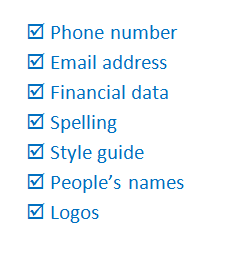I hope you find my writing and business tips and observations useful. My business and blog are dedicated to helping businesses communicate clearly and reach their potential.
Read, subscribe to my newsletter, enjoy!Tash
Do you need to hire an expert?
Recently, I saw an article called ‘do you need to hire a SEO expert’.
My immediate response was yes and no – depending on what you mean by ‘need’, you may or may not need a SEO expert.
Do you need an SEO expert because you have to be qualified or an ‘expert’ to do it (to at least an acceptable level)? No, not really.
However, an expert may do it faster and have knowledge to work more efficiently and get better results, but it is possible to do it yourself. Of course, if you don’t know anything about SEO and have to study it first, an expert’s value is greater.
Do you need an SEO person to help you get SEO done alongside everything else you do? Then quite possibly, yes you do. It depends on how busy you are and how much importance you place on SEO obviously, but SEO is one thing you can consider outsourcing.
Of course, if you are just after time saving, you may be able to use someone to work on your SEO (such as finding places to guest blog or comment and checking your site for deadlinks and duplicate meta data) rather than finding someone qualified to give you advice and expertise.
Does the same apply to hiring a professional writer?
Again, it is a maybe type of answer.
Do you need a professional writer to help you get everything done in a working day? Yes, you quite possibly do need help.
Do you need a professional writer because you can’t do it yourself? That depends on what you’re after. Most people in business can probably write webcopy and blog posts themselves so a writer is perhaps not necessary to get the content onto the page.
However, some people can’t write well so would get much better results via a professional – and probably find it is done with less time and stress, too.
Some people can write reasonably well, but will still benefit from someone who has a better understanding of business writing and can be objective about the content.
So if you can write with good spelling and grammar, understand about writing for a business audience and have plenty of time, no you don’t need a professional writer to help you!
You’d think the big guys would get it right…
Is it just me, or do you have more tolerance of a small business making mistakes than a big business?
That is, for mistakes like spelling errors, dead links on their website, out of date information and lack of clarity in a message.
I think if you have the budget for huge campaigns, you have the budget to get a writer or editor to help you avoid stupid mistakes. A sole trader on the other hand often has less money to spend and more hats to wear so mistakes are a little more excusable.
Budget for the details
I was asked by a major entity to complete a survey that they intend to use to produce some data that can impact on the digital media and brands.
It was longer than I expected but more than that, it was very disappointing from a group that is producing such a report.
Having a poor survey through lack of attention to detail reduces their credibility – if they can’t get the questions right, is their analysis going to be any good?
Compared to the time and money they have put into preparing and promoting this survey, and then turning the results into a report, it would have cost little to have had it reviewed by a writer or editor to ensure it would work. It’s like spending a million dollars to build your dream house but not checking the architect remembered to add a front door.
International survey
Some of the issues I came across in this particular survey were:
- I was invited twice (ie via two different .com.au email addresses) to complete this survey. Yet there was a question ‘Please enter your five digit zip code’ – my four digit postcode wasn’t accepted. So are they so ignorant to not realise we don’t all have a US zip code (the error messages actually stated “You must enter a valid US zip code”) or was this survey only meant for US residents?
Tip: if preparing any sort of online form, make it usable for all aspects of your audience – and make it clear at the start if some groups can’t participate - There were too many assumptions within the questions, but I had to answer them anyway so they are getting meaningless results from the survey. For example, “which of the following do you generate money from?” listed about six possible answers – I don’t earn money from any of them but there wasn’t a ‘none of the above’ type answer.
I did get some satisfaction in a couple of those questions if they at least gave an ‘other’ option as I wrote the real answer in that field!
Tip: always have an answer for everyone in a survey – if people can’t answer, they can skew your results with dummy answers and it frustrates them - One question asked ‘what is your key source for finding companies that don’t meet your requirements?’ followed by a series of criteria that you could use to filter out a company and a couple of other points. In other words, it made absolutely no sense and I couldn’t answer it – well I used the ‘other’ field to say it made no sense so I couldn’t choose from their list!
Tip: always do a final read of materials to ensure everything makes sense. Edits along the way can change things so read it in full to be sure – and preferably get fresh eyes to view it, too.

Poor data can’t result in a good report, whichever way you add it
One better written question they included asked where I got inspiration for my blog posts. I could only select one answer, which is limiting as I find inspiration in many places. However, I again used the ‘other’ option and wrote I am inspired by poor communications efforts I see – such as surveys like this with poor questions! You have to find fun where you can, I say!
So not a great survey (and I will struggle to trust their results) but it did inspire a blog post and gave me some amusement using their ‘other’ fields!
The rewards of hiring a business writer
Occasionally I am asked what return on investment (ROI) people can expect from hiring a professional writer. And now I have your curiosity peaked, too, I can’t give you a straight answer – sorry!
 I can’t give a dollar figure (or even a percentage) as there are too many variables to factor in – the type of business you run, what aspects you get professionally written (eg just an about us page or your entire website), your profit margins and how you utilise the words the writer scribes for you.
I can’t give a dollar figure (or even a percentage) as there are too many variables to factor in – the type of business you run, what aspects you get professionally written (eg just an about us page or your entire website), your profit margins and how you utilise the words the writer scribes for you.
However, I can give you some ideas to assess how a writer can reward you and your business so you can decide on your own ROI…
- at the worst, you gain time for selling and servicing customers. So if you hire me to do two hours writing for you, that’s two hours extra in your working week – in fact, if you don’t write as fast as me, you’ve saved more than two hours which you hopefully spend on making money!
- for online content, remember that content is king. Fresh, quality content will result in more links and traffic which ultimately increases your chances of making sales
- sending out a clear message and ensuring that your website answers all key questions competently will save you phone call and emails asking basic questions. In reality, that saves you frustration, time and the time it takes to get back on task after such interruptions
- polished and professional content will build your image and reputation as much as your message does, and possibly more so. A stronger reputation builds your credibility which will have a long-term positive impact on your sales
- a proposal that flows, is spelt correctly, etc is more likely to win you work
- a well written website will have a higher conversion rate (ie will turn more visitors into buyers) than a site that is hard to understand or uses poor grammar and spelling – remember that doubling your conversion rate will double your turnover…
Have you experienced a good ROI from hiring a business writer?
Let me finish with a quote from Brad Sugars, entrepreneur and multi-millionaire, author and investor:
Communication is the lifeblood of business, and when it comes to sales, it’s vital. It has a direct relationship with sales. You see, the better you are at communicating, the better your sales results will be. You can almost measure the one with the other… Let me put it another way. True communication is the response you get. So if you’re not getting the response you want, you’re not communicating properly.
When can a professional writer help?
It isn’t only people who ‘can’t write’ who use the services of professional writers like me; in fact, many of my clients can write reasonably well. However, there is a misconception that hiring a writer means you are stupid or can’t write so I thought I’d share a few examples of where people find it helpful to talk to a professional writer.
1. writing about yourself. I’ve had a few people who are excellent writers ask me to write their website about us page or a business profile as they don’t feel objective enough to write about themselves
2. writing specific items. It takes some different skills and knowledge to write web content and technical reports for instance, so I have clients ask me to write their procedures but write their own web copy.
3. they don’t like writing. I don’t like doing data entry or researching differences between mobile phones, and I don’t expect that everyone likes writing as much as I do 🙂 Many of my clients are relieved to be able to hand me their written needs so they don’t have to face it themselves – and because it leaves them time for what they do like doing (hopefully!)
4. writing takes time – and we’re all busy. For my clients who can write, time is usually the biggest reason they hire a professional writer – they are simply too busy to write their own material. In many cases, I can write it faster than they would have anyway, so it saves them time in two ways really.
5. consistent and effective results. I write all the time and can set aside blocks of time for clients so what I produce for them is consistent (within that document but also with their other materials) and effective whereas they have more distractions if they try writing it themselves so the result is often less than optimum.
Can you relate to any of the above reasons for using a professional writer? How do you deal with such situations if you don’t hire professinoal help?
From conference to blog!
Writing a blog seems like an obvious thing for a writer to do and it has been on my to do list for some time, but I never had the time to look into it.
Two weeks ago I went to the inaugral Business Mums Network Conference. It was a fantastic two days and I came out of it with a lot of ideas and plans for my business. Amongst other ideas, was a further incentive to get a blog started, so here it is!
What else did I get from the conference? Well, I am going to change the way my business works so I get more time for writing (which I love) and less time on background communications tasks for my corporate clients. It is important to spend time doing what we love and are good at, rather than filling our hours with ‘stuff’ that may be urgent and even important, but not fulfilling or the most important.
But for now, back to the writing!




Recent Comments